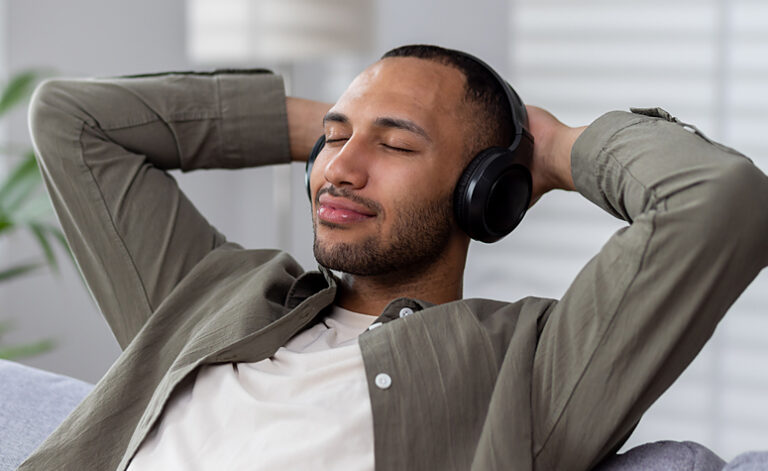Music Therapy for Addiction Treatment Explained
Music therapy in addiction recovery is about using music to help people feel better mentally and emotionally as they work on overcoming substance addiction. It’s a way to improve not just how you think and feel, but also how you interact with others and perceive the world, pushing you towards a life without the need for substances.
Whether you’re listening to music, making your own, playing instruments, or even just thinking deeply about music, it can really uplift your mental health and bring many other positive changes. These benefits are very important because they help strengthen your determination to stay away from substances and build healthier relationships and social circles during your recovery journey and beyond.
Music therapy offers a number of different activities to support recovery, including:
- Dancing
- Singing
- Playing an instrument
- Songwriting
- Listening to music
- Humming
- Music-assisted relaxation
The main goal here is to help you express deep emotions, to talk openly about how music makes you feel and the personal connections you have with certain songs, types of music or melodies.

How does music help people with addiction?
People dealing with addiction know how calming music can be. When stress levels go up, diving into music can really help you relax and feel more at peace.
Music doesn’t affect only your mind; it actually affects your body, too. Listening to music can make your heart rate slow down, relax your muscles, and lower your blood pressure. All these physical changes help your mind feel more stable and calm.
Several scientific theories delve into the workings of music therapy. Stefan Koelsch, a neuroscientist, has pointed out five key ways in which music therapy works as one of the many tools in the journey to recovery:

- Distracting the mind
Music is a distraction, helping you escape from painful, troubling thoughts and feelings. Instead of bottling everything up, music lets you express yourself and get those emotions out.
- Managing feelings
Music is great for getting your emotions in check. When you listen to the music or create it, your brain gets a boost in blood flow, especially in areas that help you handle your emotions.
- Increasing brainpower
There’s proof that music can make your brain sharper. It improves cognitive functions like memory, how you feel pleasure, and even your language skills. You activate these parts of your brain when you’re singing or creating tunes.
- Sparking action
Music also inspires many people to be productive. Did you ever notice how the right song can make you feel like you can conquer the world? That’s music stirring up your inner motivation and pushing you to get things done.
- Breaking down walls
Music helps us connect. It presents a way of sharing feelings and ideas, whether you’re on the giving or receiving end of a song. Making music is a way to say what’s in your heart and find people who get it.
For people wrestling with addiction, these boosts from music therapy are a truly invaluable tool in the road to recovery. Addiction can hinder your ability to focus, manage emotions, think clearly, act positively, and communicate well. Music therapy, by zooming in on these issues, can lead to real progress in tackling the symptoms linked to addiction.

The Benefits of Music Therapy For Addiction Treatment?
People who love music generally look forward to their music therapy sessions. This excitement makes them more likely to keep showing up. Additionally, these sessions are so inspiring that people honestly want to take part.
Another advantage is that everything you learn in music therapy can be used in your everyday life, too. Of course, that doesn’t mean that playing music on your own is the same as having a professional session. However, the techniques and activities you pick up can be practised at home.
This means you can keep benefiting from music therapy even when you’re not in a session, something that’s not always doable with other types of treatment.
Lastly, there’s plenty of evidence showing how effective music therapy is for various mental health issues, including addiction. It’s all backed by science, so therapists can tailor the sessions to what each person needs. For instance, music therapy can help ease the tough symptoms that come with detoxing from drugs or alcohol.
Is Music Therapy for Addiction Treatment for Everyone?
Not everyone going through addiction recovery will respond to music therapy, which really highlights why it’s crucial to have different kinds of therapy available in rehab. Using just one method might not work out for everyone. That said, you won’t know if it will be a good fit for you until you actually try it, so try to keep an open mind. In rehab centres, music therapy could already be part of what they offer, or you might be able to ask for it to be included in your treatment plan.
If you’re looking into music therapy outside of a rehab setting, there are licensed therapists who work with individuals and groups in their private practices. Just make sure you check that the therapist is officially licensed to practice music therapy.
Frequently asked questions
Yes, of course! You don’t need to be a musician or know how to play an instrument to get into music therapy. Even if you’re not someone who actively engages with music, you might find that this type of therapy can still do wonders for you.
There are plenty of ways to do music therapy. You can start learning an instrument, or you can just focus on listening to music in your sessions. Our therapists will talk with you beforehand to figure out what you like and make sure you’re not expected to play an instrument if you do not wish it.
Absolutely. Music therapy can be a big help in avoiding relapse. However, to truly lower the chances of slipping back, it’s best used alongside other treatments—like detox, standard therapy methods, and maybe even holistic therapies, too.
If you have a hard time resisting the old habits, music therapy can help you. It also improves your ability to deal with emotions, so you’ll learn how to accept and overcome tough feelings like guilt, shame, and loneliness.
Both options are available. You can either go for one-on-one sessions or join group therapy. In individual sessions, you will get the privacy you need to really express yourself through music. That can give you crucial insights about your addiction.
On the other hand, group sessions allow you to become a part of a community. This is where you can be open and supportive, and allow others to share their experiences. Having such a safe space can make a huge difference in preventing relapse and fostering a stronger recovery.
Music therapy is actually a great fit for people who struggle to express themselves. You don’t need to use words to get involved with music. You can connect with the therapist and express yourself simply by reacting to the existing songs or the music you make yourself.
Additionally, music therapy can even help improve how you communicate. It can be particularly beneficial for people with conditions like dementia, who might struggle with speaking.
We use all sorts of music genres — there’s no single genre that everyone has to listen to. What’s important is that you actually like the music.
When it comes to making your own music in therapy, you have complete freedom to make whatever sounds and words feel right to you. The therapists don’t care as much for the type of music as they are more interested in allowing you to see your true self and creativity shine through.
Definitely! Music therapy works really well alongside other types of treatment, especially holistic therapies. For instance, you can combine music therapy with art therapy by painting while listening to music. Or, practice mindfulness as you enjoy your favourite music.
Mixing music therapy with other treatments helps you connect on a deeper emotional level. It’s not just about listening to music; it’s about actively engaging with it and letting the music guide your emotions and thoughts.
Choosing just music therapy instead of going for a full-on drug and alcohol rehab programme isn’t really recommended. A comprehensive treatment programme that uses various therapy types is much more effective for recovery.
Music therapy sessions usually happen once a week, which might not be enough to give you the steady support you need to beat substance addiction. Being in a rehab treatment centre, where you’re away from any drugs or alcohol, plays a major part in getting better.
While music therapy has a lot of benefits, leaning on it as your only form of treatment for addiction might limit your personal growth. Joining a rehab programme means you get to try out different kinds of therapies, giving you more tools to tackle substance use disorder.
FREE Addiction Assessment
If your or a loved one are struggling with addiction, we understand the challenges you’re facing and we’re here to offer compassionate help.
Our highly trained advisers are available to speak to you right away, simply call 0808 252 3379 today.
We can discuss your concerns in complete confidence, explore the options for treatment, and help you to understand what will work best for you.
We’ll also help you to book your free addiction assessment there and then, with appointments usually available within only a few days.
We understand that taking the first step can be the most difficult, but we’re here to support – with no pressure or judgement.
Professional and compassionate help is just a phone call or click away.




